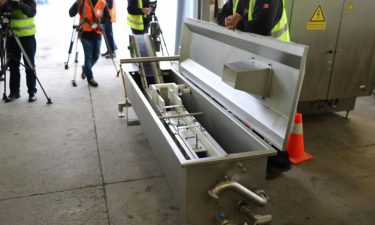University in New Zealand starts pulsed electric field French fry experiment
- Like
- Digg
- Del
- Tumblr
- VKontakte
- Buffer
- Love This
- Odnoklassniki
- Meneame
- Blogger
- Amazon
- Yahoo Mail
- Gmail
- AOL
- Newsvine
- HackerNews
- Evernote
- MySpace
- Mail.ru
- Viadeo
- Line
- Comments
- Yummly
- SMS
- Viber
- Telegram
- Subscribe
- Skype
- Facebook Messenger
- Kakao
- LiveJournal
- Yammer
- Edgar
- Fintel
- Mix
- Instapaper
- Copy Link
Posted: 29 June 2018 | George Smith (New Food) | No comments yet
The three-month industry trial is supported by Potatoes New Zealand and is in collaboration between Elea (Germany) and the University of Otago.


DREAMING ABOUT AN ELECTRIC FIELD: The technology has usually focused on liquid processing so far
University of Otago researchers have begun an experiment demonstrating the potential of a new technology which could see New Zealand production of a popular food – the French fry – become healthier, and less costly and wasteful.
Recently arrived pulsed electric field (PEF) processing equipment will be put to test for large scale French fry production over the next three months.
This technology, which uses brief pulses of electricity (microseconds) to modify and disrupt the membranes of cells in plant or animal material or microorganisms, has a wide variety of applications across many food processing industries.
The electric field being pulsed through un-cut potatoes during processing alters their microstructure, which results in a more controlled release of sugar, more uniform colouration and reduced oil uptake. It also enhances processing as the softer texture makes the potatoes easier to cut, meaning there is less waste, the ability to develop new shapes (e.g lattice cut) and increased knife durability (up to 60 per cent).
As pulsed electric field processing affects the cell membrane it can be used to enhance the extraction of pigments or bioactive compounds from food, increasing their yield and quality or to kill micro-organisms as alternative to the pasteurisation of bulk liquids, such as fruit juices and milk.
The industry pilot programme is part of a Ministry for Business and Innovation funded Food Industry Enabling Technology (FIET) programme worth nearly NZ$ 16.8m, over a six year period (2015-2021). There are six institutions involved in the programme: Massey University (host), the University of Otago, the University of Auckland, Plant & Food Research, AgResearch and the Riddet Institute. The University of Otago leads the research and industry implementation of PEF technology.


The new PEF processing machine Photo: University of Otago
“With the equipment now in New Zealand we are excited to begin the industrial trial with the hope of proving the techniques, and in time enabling New Zealand food industries to benefit from this new technology,” said University of Otago Professor Indrawati Oey, Head of Otago’s Department of Food Sciences and the PEF project leader.
“PEF also has potential to enhance the quality and value of many other NZ agricultural and horticultural products,” added Professor Oey.
Related topics
Equipment, Fats & oils, Health & Nutrition, New product development (NPD), Technology & Innovation









